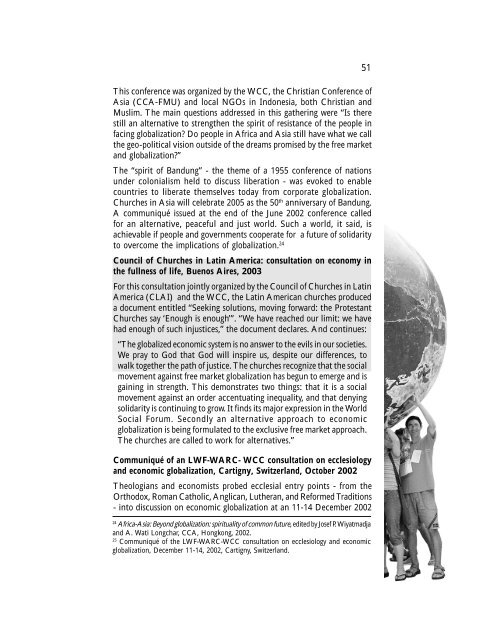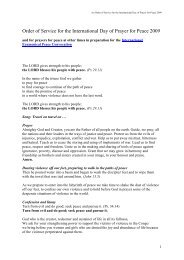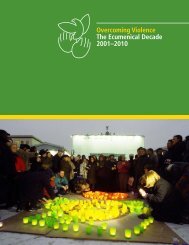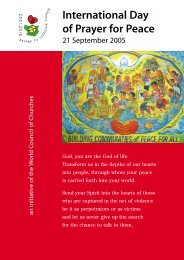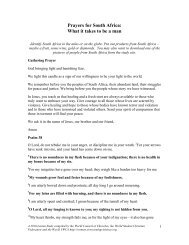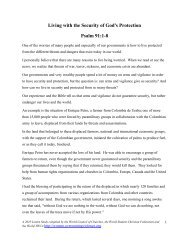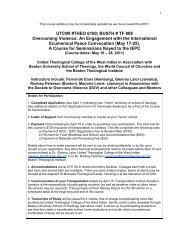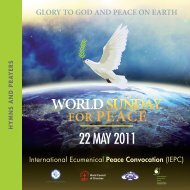Alternative Globalization Addressing Peoples and Earth
Alternative Globalization Addressing Peoples and Earth
Alternative Globalization Addressing Peoples and Earth
Create successful ePaper yourself
Turn your PDF publications into a flip-book with our unique Google optimized e-Paper software.
This conference was organized by the WCC, the Christian Conference of<br />
Asia (CCA-FMU) <strong>and</strong> local NGOs in Indonesia, both Christian <strong>and</strong><br />
Muslim. The main questions addressed in this gathering were “Is there<br />
still an alternative to strengthen the spirit of resistance of the people in<br />
facing globalization? Do people in Africa <strong>and</strong> Asia still have what we call<br />
the geo-political vision outside of the dreams promised by the free market<br />
<strong>and</strong> globalization?”<br />
The “spirit of B<strong>and</strong>ung” - the theme of a 1955 conference of nations<br />
under colonialism held to discuss liberation - was evoked to enable<br />
countries to liberate themselves today from corporate globalization.<br />
Churches in Asia will celebrate 2005 as the 50 th anniversary of B<strong>and</strong>ung.<br />
A communiqué issued at the end of the June 2002 conference called<br />
for an alternative, peaceful <strong>and</strong> just world. Such a world, it said, is<br />
achievable if people <strong>and</strong> governments cooperate for a future of solidarity<br />
to overcome the implications of globalization. 24<br />
Council of Churches in Latin America: consultation on economy in<br />
the fullness of life, Buenos Aires, 2003<br />
For this consultation jointly organized by the Council of Churches in Latin<br />
America (CLAI) <strong>and</strong> the WCC, the Latin American churches produced<br />
a document entitled “Seeking solutions, moving forward: the Protestant<br />
Churches say ‘Enough is enough’”. “We have reached our limit: we have<br />
had enough of such injustices,” the document declares. And continues:<br />
“The globalized economic system is no answer to the evils in our societies.<br />
We pray to God that God will inspire us, despite our differences, to<br />
walk together the path of justice. The churches recognize that the social<br />
movement against free market globalization has begun to emerge <strong>and</strong> is<br />
gaining in strength. This demonstrates two things: that it is a social<br />
movement against an order accentuating inequality, <strong>and</strong> that denying<br />
solidarity is continuing to grow. It finds its major expression in the World<br />
Social Forum. Secondly an alternative approach to economic<br />
globalization is being formulated to the exclusive free market approach.<br />
The churches are called to work for alternatives.”<br />
Communiqué of an LWF-WARC- WCC consultation on ecclesiology<br />
<strong>and</strong> economic globalization, Cartigny, Switzerl<strong>and</strong>, October 2002<br />
Theologians <strong>and</strong> economists probed ecclesial entry points - from the<br />
Orthodox, Roman Catholic, Anglican, Lutheran, <strong>and</strong> Reformed Traditions<br />
- into discussion on economic globalization at an 11-14 December 2002<br />
24<br />
Africa-Asia: Beyond globalization: spirituality of common future, edited by Josef P. Wiyatmadja<br />
<strong>and</strong> A. Wati Longchar, CCA, Hongkong, 2002.<br />
25<br />
Communiqué of the LWF-WARC-WCC consultation on ecclesiology <strong>and</strong> economic<br />
globalization, December 11-14, 2002, Cartigny, Switzerl<strong>and</strong>.<br />
51


